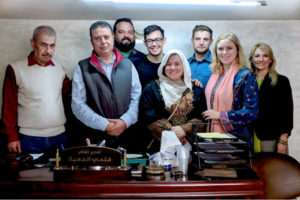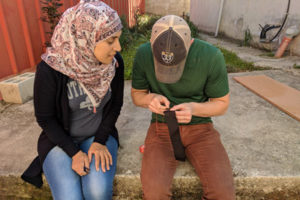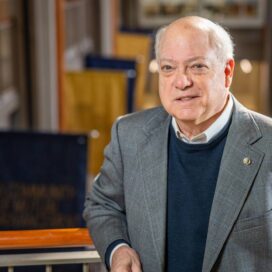‘These are real people. These are real problems.’
Published: February 25, 2019 / Author: James Karst
 Erin Wehe (MBA ’18) acknowledges that things did not go as planned for members of her Business on the Front Lines (BOTFL) team when they arrived in the Palestinian territories earlier this year.
Erin Wehe (MBA ’18) acknowledges that things did not go as planned for members of her Business on the Front Lines (BOTFL) team when they arrived in the Palestinian territories earlier this year.
Wehe, a native of Ann Arbor who is now an associate at Deutsche Bank in New York, said that it became clear “just five minutes into being there (that) everything we thought was wrong.”
That forced her team to think on the fly and to work together to adjust to a situation they had not expected. They changed direction, and they made things work. The experience in navigating failures along the path to success has proven valuable in her banking career, she said.
“It doesn’t always go well, which is exactly the way BOTFL is, but you just kind of have to push through it,” Wehe said. “It’s part of the learning experience.”
She had never been to the Middle East before. Most of what she knew about the region came from news reports. What she experienced when she got there was another surprise. It was hot — and downright uncomfortable at times since the women wore long sleeves and skirts. But the Palestinian territories are not all desert.
“Everything was green, and there are hills and it’s absolutely gorgeous,” Wehe said. “So it was quite the pleasant surprise to just be able to see the oasis there.”
Her team’s project was to help the struggling Darzah shoe manufacturing business. The exquisite hand-embroidered shoes are sold at stores, trade shows and fairs, but creating viable permanent jobs for the disadvantaged women who make them had proven difficult because of limited sales volume.
The team had done extensive work to prepare for the project before traveling to the Palestinian territories. Based on information the team was provided, it believed that what was holding the women back was cost. They were paying too much for materials, and that was resulting in a retail price that was too high to sell in enough numbers.
After arriving in the Middle East, though, the team soon realized that price was not the problem.
“We had all these plans, everything was buttoned up really nicely, and then we got over there and the first thing we do is meet these male shoemakers, and we found out they were actually charging a low rate,” Wehe said. The team’s hypothesis went out the window.
What followed was what Wehe calls “team-building to an extreme.”
 As Wehe and her colleagues dug deeper into the inner workings of the business, they figured out that the Darzah shoe makers had a demand problem, not a supply problem. They needed to move more shoes.
As Wehe and her colleagues dug deeper into the inner workings of the business, they figured out that the Darzah shoe makers had a demand problem, not a supply problem. They needed to move more shoes.
By expanding sales operations through effective marketing and bringing the entire manufacturing process in house, the Business on the Front Lines team determined, Darzah can meet its goal of putting more Palestinian women to work. Darzah is now seeking grant funding to follow the recommendations of Wehe’s team.
Seeing that the women had the capacity to produce more shoes, connecting with the suppliers and solving a shipping riddle could only have been accomplished by traveling to the Palestinian territories, Wehe said. Her team saw firsthand what worked and what didn’t. That made all the difference.
“The stakes are high when it comes to these individuals who are living in post-conflict environments,” she said. “And they wouldn’t have come to BOTFL unless something was not working correctly.
“And to be able to experience it — it’s not just in a classroom, these are real people, these are real problems,” said Wehe, who chose Notre Dame for its smaller class sizes and ethics-centered curriculum. “And to be able to take the framework that we learned in Mendoza and the framework that BOTFL then ingrains in us further, and actually apply that to something that’s really making a difference in people’s lives, it’s huge.”
Business on the Frontlines, a signature course of the Notre Dame MBA, has a unique goal: to examine how to harness the dynamism of business to rebuild war-torn societies as a means of bringing about peace. BOTFL teams study a business challenge presented by an outside partner, such as an international humanitarian organization or multinational corporation.
In the spring semester, they fan out across the world to conduct fieldwork, meeting with everyone from government leaders to street vendors. The team provides the partner with detailed reports outlining sustainable solutions to the targeted problem.
In its 10-year history, BOTFL teams have participated in more than 40 projects in 20-plus regions and countries. By one estimate, thousands now earn livelihoods as a result of BOTFL projects in the field.
Related Stories




